- 3 Divisions per Level: 35 Students per class
- From STD I to STD XII
- Resource Room
- Counseling services
- Sick Bay
- Print-rich Environment.
- Nurturing and caring climate.
- PTC (Parent-Teacher interactions, Conference Open days)
- Dedicated and Trained Staff.
- Comprehensive Candidate Selection Process
- Continuous in-service training for teachers and Staff
- E-Technology.
- Social conscientization and emotional literacy.
Features : 3 Divisions per Level & 35 Students per class
PRIMARY
| CLASS | CLASS NAME |
| I | Flamingos, Swans, Toucans |
| II | Pelicans, Robins, Skylarks |
| III | Dahlia, Petunia, Zinnia |
| IV | Lily, Poppy, Tulip |
MIDDLE
| CLASS | CLASS NAME |
| V | Canary, Oyster, Sepia |
| VI | Aster, Blush, Fuchsia |
| VII | Auburn, Ebony, Sienna |
| VIII | Honeydew, Ivory, Pearl |
SECONDARY AND SENIOR SECONDARY
| CLASS | CLASS NAME |
| IX | Beige, Fawn, Khaki |
| X | Iris, Periwinkle, Plum |
| XI | A, B, C |
| XII | A, B, C |
Congratulations Shaunak Kulkarni – The champion of presidency challenge, Southern India – war of Words Debate competition, 2015.
You have made the Orchid Flag fly high !!
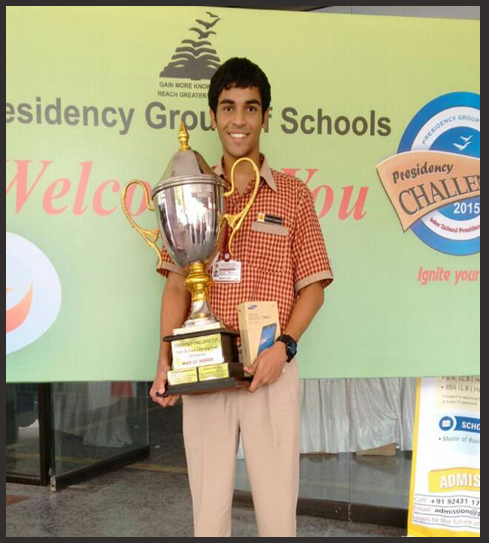
Feature : Resource Room
The Resource Room is a holistic space created with the sole purpose of providing help and support to students with special needs. Here, their struggles are addressed individually by trained special educators who create education plans for them based on the student’s potential and needs. The Special Educators support students in school at various levels:
- Regular meetings with all mainstream teachers to provide classroom support.
- Step in class for observations and provide assistive teaching if and when required (AT)
- Take small group instruction for students with academic struggles in addition to those with disabilities for remedial skills during Parallel Program (PP) session during school hours
- Provide examination support to all students with diagnoses
-
Resource Room consists of students with more severe disabilities who have a large gap between their expected level of performance and their current level of functioning.
- Students are included in all co-scholastic activities in the mainstream class.
- If they are able to understand and manage mainstream classes, then some of the academic subjects are covered in the mainstream class with an option of modification in syllabus and examination papers.
- An Individualized Education Plan (IEP) is made for the rest of the academic subjects to suit the needs of these students.
- Activities curated for holistic learning and focus on fine motor skills, storytelling, Maths and Science experiments. The main aim is that there is an equal emphasis upon learning the essential life skills that would equip them in becoming independent and self functioning individuals.
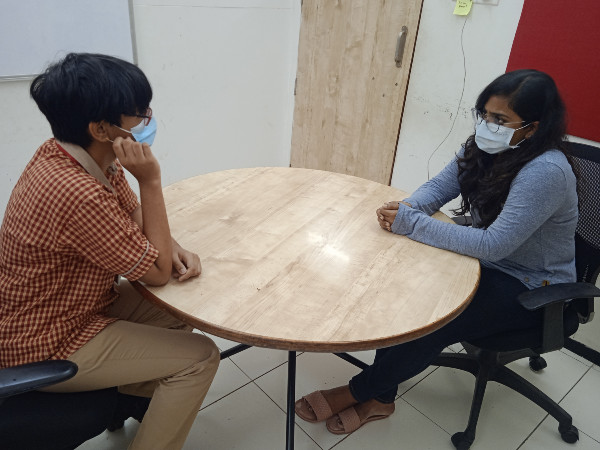
Feature : Counselling Services
We firmly believe that it is imperative for an individual to be socially, emotionally and behaviorally well adjusted in order to function to his/her complete potential. The focus of counseling is on the preventive and promotive mental health of all stakeholders involved in the development of the child.
There are three counselors on board at TOS, one for each domain (Primary, middle and Secondary & senior secondary).
The counsellors:
- Empower individuals to develop their competencies and draw on resources to effect changes.
- Consult and collaborate with parents, teachers, school administrators, and allied professionals to design interventions and implement strategies to help students.
- Collaborate with school personnel to initiate positive changes to school policies.
- Help students in developing age-relevant life skills and essential 21st century skills.
- Enable the students to be more socially and emotionally aware individuals.
Features : Sick Bay
There is a dedicated room i.e., an Infirmary where if and when a child is sick or hurt, he/she can go to the sick bay where first aid is administered by a trained, full-time nurse. In case of an acute injury / medical emergency, after administering first-aid, the child is immediately rushed to Jupiter Hospital, Baner in our school van. Some of the school staff has also been trained in administering basic first aid. .
Features : Print Rich Environment
Print Rich Environment in the class room
In a well-established and well-organized classroom at The Orchid School, there is print everywhere! This does not negate the fact that visual picture reminders of classroom schedules, rules, etc., are critical to the social and emotional development of the children. However, words are placed next to any visual clue to help the children understand about print. Here are ways that a teacher at Orchid creates a print-rich environment.
Posted Alphabet -
There are at least two alphabet charts posted in every classroom in the Lower Primary classes. These charts are at the eye level of the children. Items posted above the child’s line of sight are:
Name Labels -
A child’s name is one of the best ways to teach about print. Each child’s name appears at least 4-5 times throughout the classroom. For e.g.- Attendance cards, helper boards, center tags and name.
Item Labels -
Block shelves, listening centers, writing tables and group areas should all have written labels indicating the word that best describes that area. Each word is accompanied by a picture of the item as a visual reminder about the word.
Classroom Libraries -
Each classroom has always at least 4 books per child available. They keep them in a shelf in one corner in the classroom where the children, in their free time, can go and read.
Writing Centers -
Early childhood classrooms should always contain a writing center. While these centers will eventually help in the development of handwriting, for younger children they are critical for the development of fine motor skills and learning about print. Keep in mind these suggestions the Orchid
School Classroom has-
1. a wide variety of tools to develop fine motor skills and handwriting skills. These tools include large pencils, large crayons, large brushes, markers, finger paints, chalk, etc.
2. children are provided with different types of writing materials for experimentation. Newsprint, construction paper, tag board, coloured and white paper are all part a long list of different types of paper that are fun for the beginner writer.
Display Boards and Soft Boards -
Each class from lower primary to Class 12 are provided with soft boards inside and outside their classrooms. The work of the children, their projects, write-ups, charts with subject related information is displayed. The boards are filled with the colourful displays of every subject which make the corridors and the classrooms lively and motivating for the children.
Supporting literacy in the classroom is critical in the early years in helping children become literate individuals. Good teachers continually ask themselves what more they can do to create a literacy-rich environment for their students.
Features : Nurturing and caring climate
Traditionally, teachers used to think of a conducive classroom environment as one where students are under the complete control of the teacher through rules and regulations which he or she has set.
However the trend today is different. The classroom and school environment is now more inclined towards providing a caring and nurturing learning environment.
It is just the same at The Orchid School. It is composed not only of the physical features of the school and classroom but also the attitudes of the students and the teacher. The development of the students is tied to the physical and socio-emotional climate that they experience in The Orchid School.
The classrooms are more student centered where teachers and students facilitate the activities in the class. Students become an integral part in managing the classroom dynamics. Discipline comes mostly from one’s self.
Teachers at TOS work continually to see what makes their students unique. They let the students have the opportunity to know themselves and be aware of their strengths and weaknesses.
At TOS forming congenial relationships is a priority by carrying out respectable dialogues, by practicing encouragement and affirmation, by taking decisions through shared involvement and resolving conflict through amicable methods.
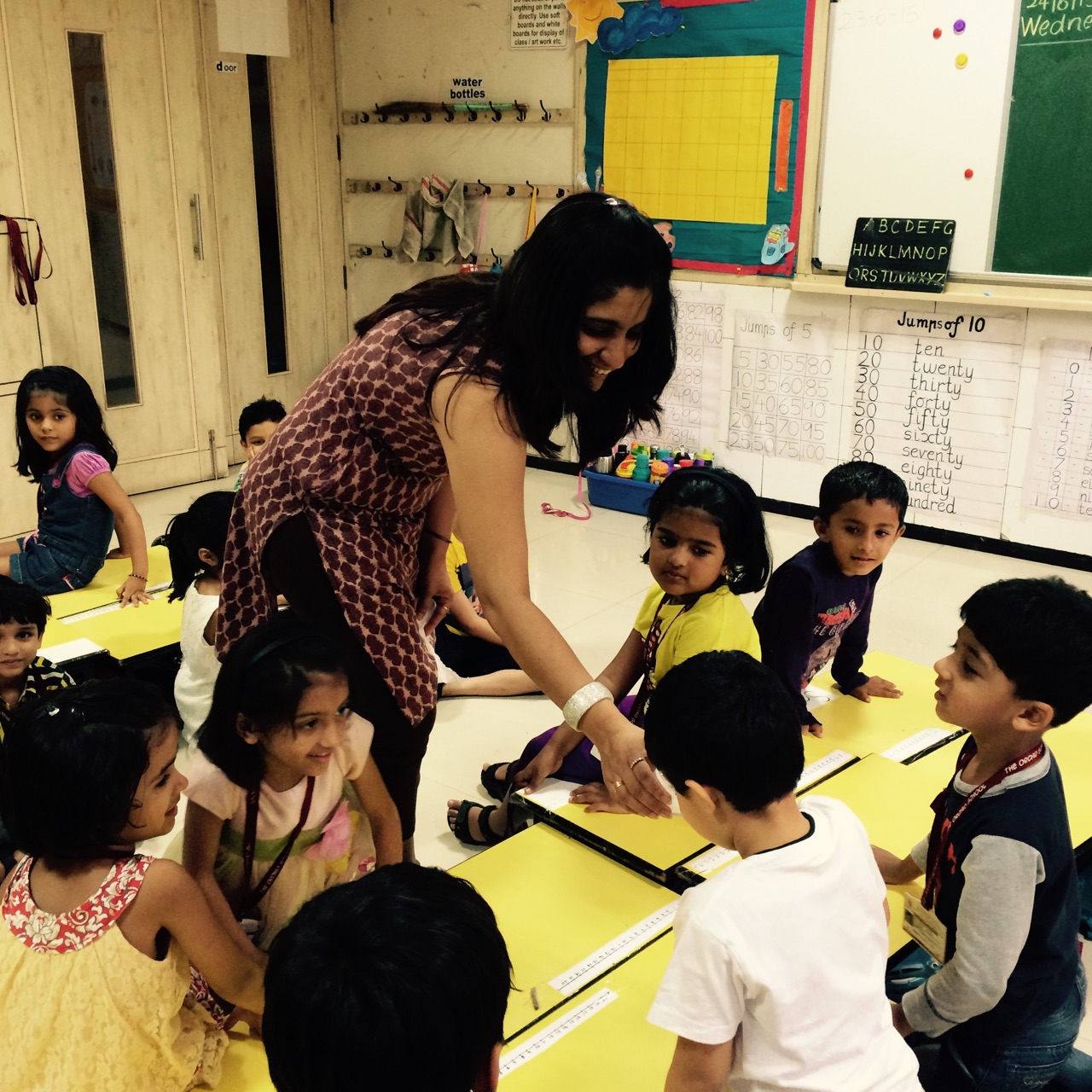
Feature : Parents Awareness And Training Progamme
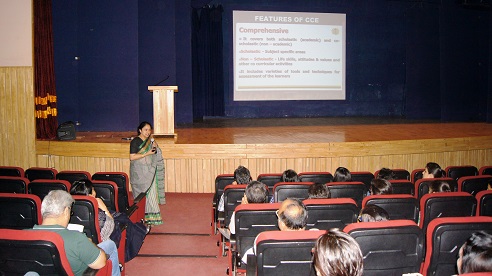
Feature : PTC (Parent-Teacher interactions, Conference and Open days)
A Key object of the PTC is to bring into closer relation the home and School, that parents and teachers may cooperate more intelligently in the education of children and youth.
Twice a year, the School invites Parents, which helps them to know about the Child’s Academic performance. Parents come to know the behaviour of the child. In this way parents and teachers cooperate with each-other intelligently in the training of a child. At TOS we believe that if both parents and teachers come together, know each-other, understand each-other, it helps in growth and development of child’s progress.
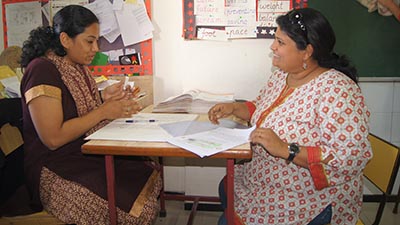
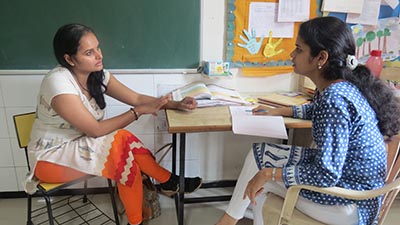
Feature : Dedicated and Trained Staff
Feature : Comprehensive Candidate Selection Process
All appointments to all categories of employees shall be made by the Selection Committee nominated by the School Managing Committee, either by direct recruitment or by promotion through a selection process recommended by the School Managing Committee and ratified upon by the Board of Trustees.

Steps/ Procedure for selection:
Pre planning:
- Staff requirement
- Level for which staff ( specially teaching) is recruited
- Subject specialization , if any
- Qualification required for the post
- Experience if any needed
- Special qualities, skills, traits needed for the post
- Pay scale recommended ( consolidated or on scale)
- Duration – if temporary or long term assignment.
Advertisement
The ad must say the following
- School address, website, email and phone numbers
- The number and details of vacancies
- who can apply (qualifications)
- Extra traits desired.
Receiving Application
- Received & filtered – Teachers apply up to a certain period, applications are scanned and filtered and then called for the next stages
- Walk-in – Give a fixed date and time, every applicant gets a chance to attempt the entrance test.
Selection Process: It consists of four stages
- Organizational Brief.
- Online Entrance Test.
- Written Test.
- Group Discussion.
- If Cleared then there will be Personal Interview.
- Demo lesson for teacher category and tasks for administrative staff.
- If Cleared Demo lesson/ Task then final interview.
Walk-in interviews Candidates are met for brief period by the interview panel.
This meeting gives them an idea of their role, our expectations, compensation packages and special packages. The panel gets an opportunity to check spoken English, check their true intensions and formulate initial impressions about the candidate. If they clear this stage, then they are given the entrance test.
Entrance Test
All applicants get a fair chance to express themselves and show their caliber not only in the few minutes of a tense personal interview but they can write over an extended, relaxed time.
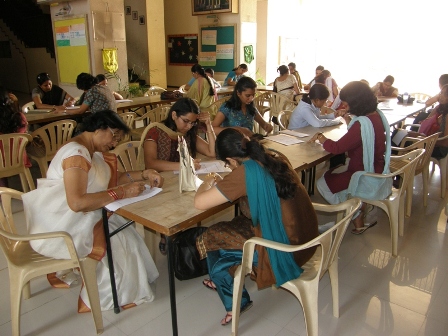
Objectives:
- To test English language proficiency
- To test subject competency and mastery of subject in a candidate.
- To test level of general awareness related to school matters, pedagogic principles and practices
- To test level of sensitivity towards child’ needs
1. Documents required for conducting entrance test:
- Fact sheet about the candidate
- Entrance test questions
2. Entrance test process:
- Administer entrance test
- Candidates submit the bio-data
- Check the answers
- Grade / marks according to the key given
- Enter the marks, remarks in grading summary sheet
If the candidate gets minimum 60% marks and if the qualifications meet with the post requirements, she / he is called for the next level - Group Discussion and or personal interview.
3. Pre-interview tasks for candidates:
Objectives:
- To test the candidates ability to demonstrate actual work / tasks assigned to them
- Grading sheet is made for the demo lesson as well as other tasks.
4. Personal Interview:
Objectives:
- To give the candidate a chance to know about the school and expected work.
- To create an opportunity for the trustees and the school team to meet the candidate
- To evaluate the candidate’s confidence level in answering range of questions.
- To clarify roles, pay scales and other practical issues concerning the candidate’s appointment
Interview process:
- Short-listed candidates are already been given a letter giving details of the interview.
- Panel of interviewers: Trustee representatives, Director, Head of the respective level ( Pre-primary, primary or secondary) and for special posts like role holders an educationist/psychologist/consultant
- Panelists are briefed about each candidate. A full grading sheet of the overall performance of the candidate is provided for reference. If any special requirements are there on part of the school, the panelists are briefed about this too.
- Grading sheet gives guidelines for marking the candidate’s performance during the interview.
5. Final Selection :
- Is based on the over all performance of the candidate at all levels of selection process.
- The list of candidates finalized are placed for ratification to the Board of Trustees
- Appointment letters sent with all details –
Acceptance copy duly signed and filed in personal file along with the bio data, attested photo copies of the degree / diploma certificates, experience letters, other reference letters, salary details etc
Feature : Continuous in-service training for Teachers and Staff
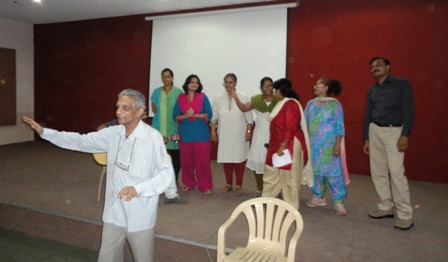

Feature : E-Technology
In order to uphold The Orchid vision of Locally rooted and globally competent education, we have included various innovative E-technology in our curriculum.
- Digital classroom equipped with interactive boards that acts as a computer, regular class board, and TV.
- The software covers curriculum , activities, charts, learning games, 2D-3D animations and videos for secondary level that cater to the CBSE schools.
- A comprehensive professional training program is given to teachers so they can use it to maximum learning.
- E-Learning is not only an investment financially but in our teachers and children to unleash their creativity within and outside the classroom.
Feature : Social conscientization and emotional literacy
Feature : Social conscientization and emotional literacy
We believe the school has a great responsibility in the development of emotionally literate and socially conscious citizens. Building a culture of social equality, peace and coexistence- i.e. the “social conscientization process” is the central agenda of our school education. Apart from skill mastery and emphasis on achieving high marks as success indicators, we want to help our children look within and beyond themselves so that they develop the ability to respond to situations with sensitivity and maturity.
Community Projects:
- Programs such as twinning activities with the nearby municipal corporation school, teaching-learning with underprivileged children help sensitize the privileged so that we can foster democracy as a way of life rather than a system of governance.
- These programs are part of the life skills module, an integral part of the school curriculum.
The Life Skills Program provides interactions which give children an opportunity to develop 21st century and socio-emotional skills like assertiveness, empathy, gratitude etc.
- These are taught through active & dynamic teaching & learning processes through the classroom interactions.
- The school counselors conduct this program, along with experts who are invited to share both theoretical & field-based perspectives.
- Group work, brainstorming and role plays are used to enhance the process of self-discovery & growth.
Facilities : Spacious well designed classroom
Facilities : Auditorium
The auditorium which is on the ground floor has a seating capacity of around 330, is used for all our concerts, events, workshops, guest lectures, quiz programs, debate, theatre, movie screening, musical programmes etc.
Facilities : Multipurpose Hall
Multipurpose Hall (MPH) –situated on the top floor is used for whole school assemblies, gatherings, presentations, teacher and parent training, workshops, small events, concert practices, celebrations.
Facilities : Open air theatre
Amphitheatre - located on the third floor is used for circle time, class related activities – where the teacher takes them for a story session. Also, it is a space which is used to stage plays and concerts in the evening.
Facilities : Junior and Senior Computer Lab
Junior computer lab on the first floor and senior computer lab on the fourth floor are used for computer theory and practical lessons. The labs can accommodate 35 children at any given time which is also the strength of a class - division wise , so each child has a computer to himself/herself.
Junior Computer Lab
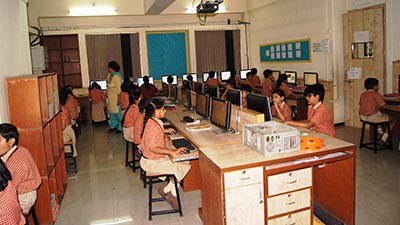
Secondary Computer Lab
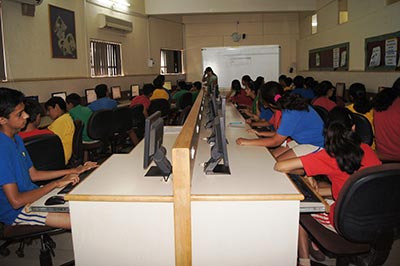
Senior Secondary Computer Lab
Facilities : Math and Concept Lab
Math Lab Children use the math lab to enhance their computation skills and mental math abilities. It is a space with resources which facilitate hands on experience to enrich the Math program.
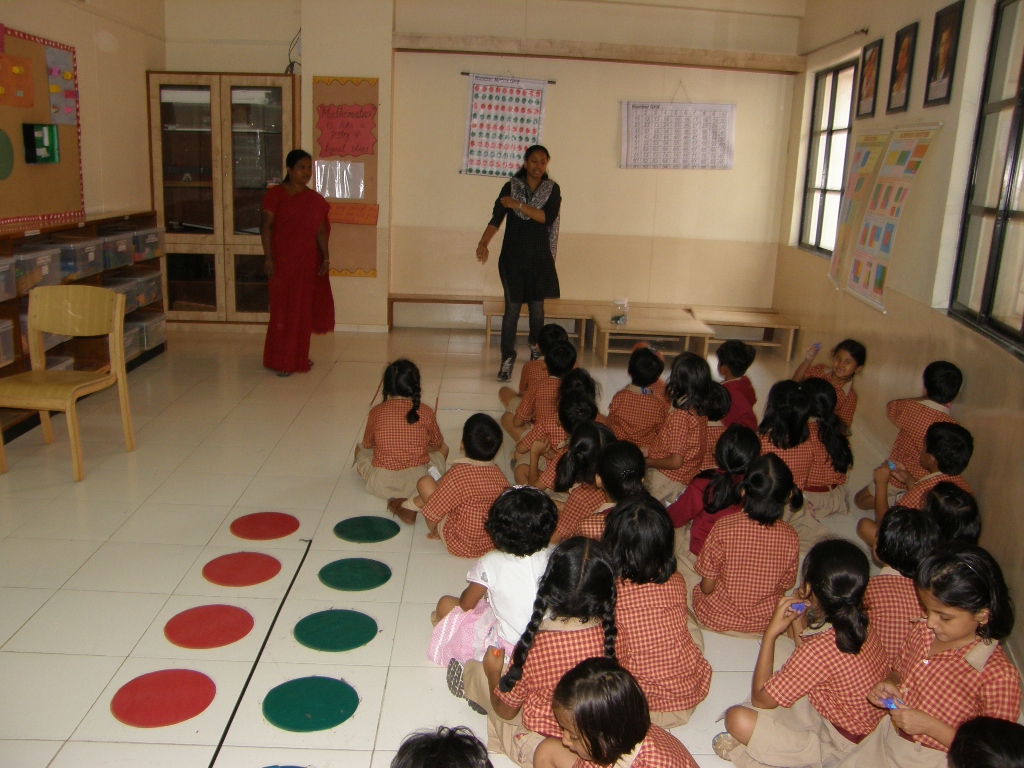
Facilities : Science Lab
The school has well equipped Science Labs for Physics, Chemistry and Biology. Science labs are a great place for students which help them to develop their scientific temperament and enhance their observation skills. Students observe and perform experiments, investigatory projects in labs which help them to build their research and analytical skills.
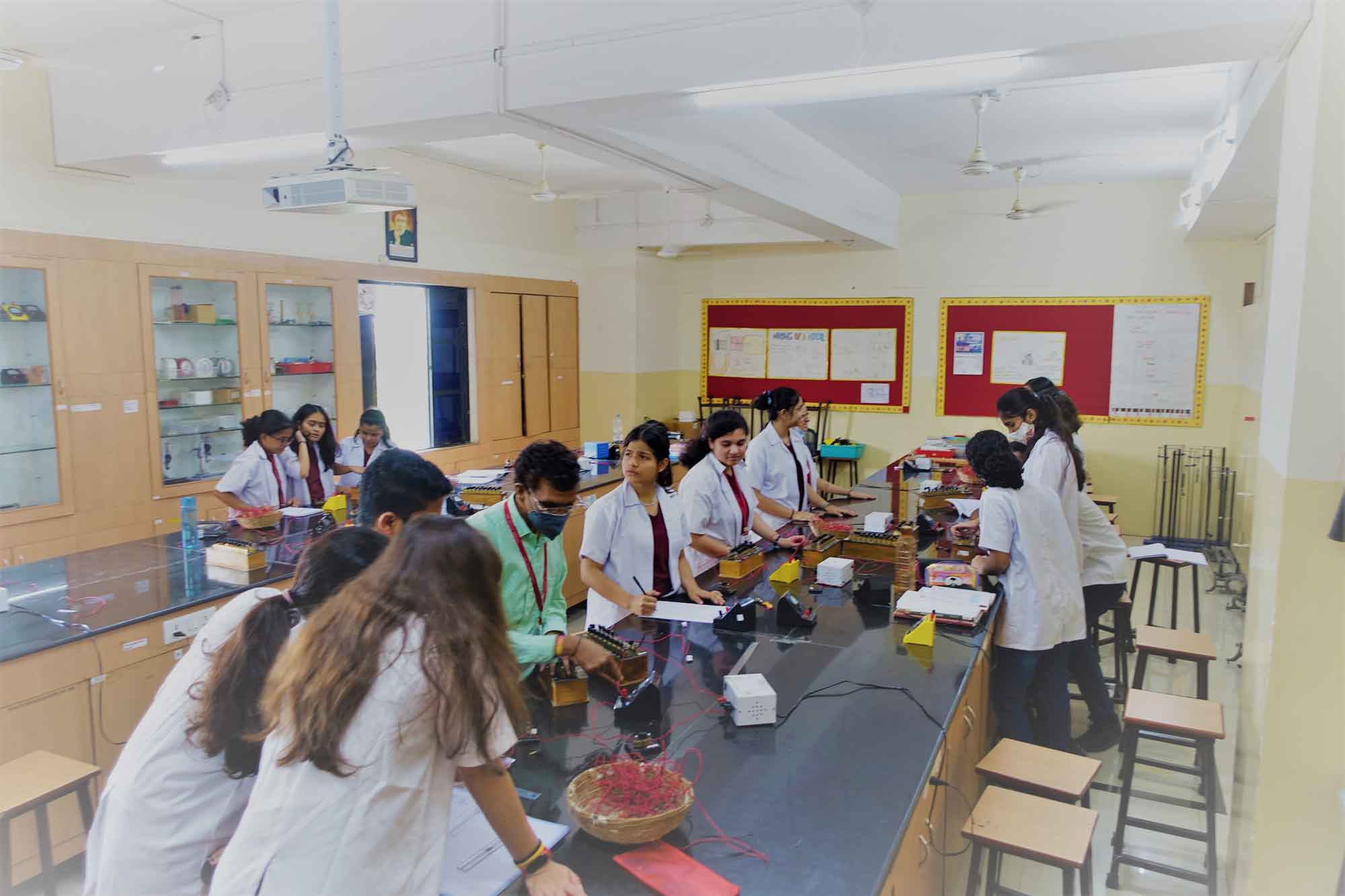
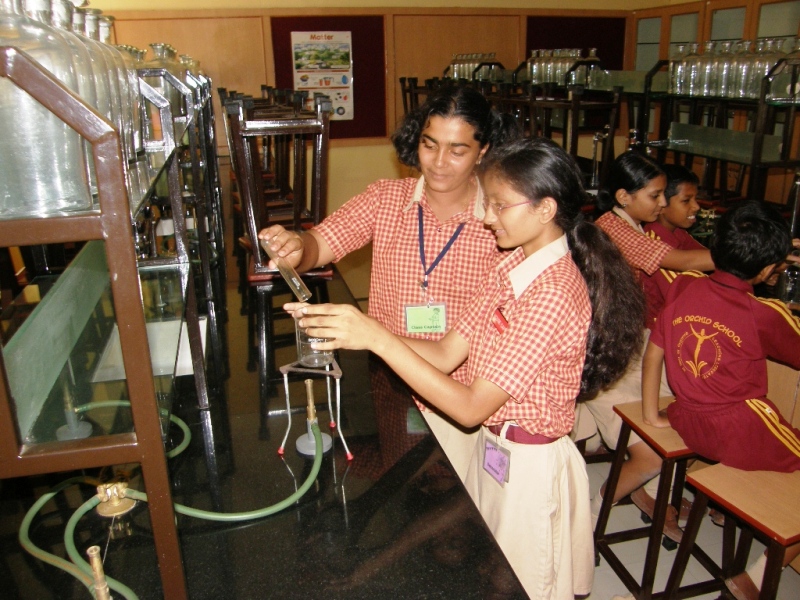
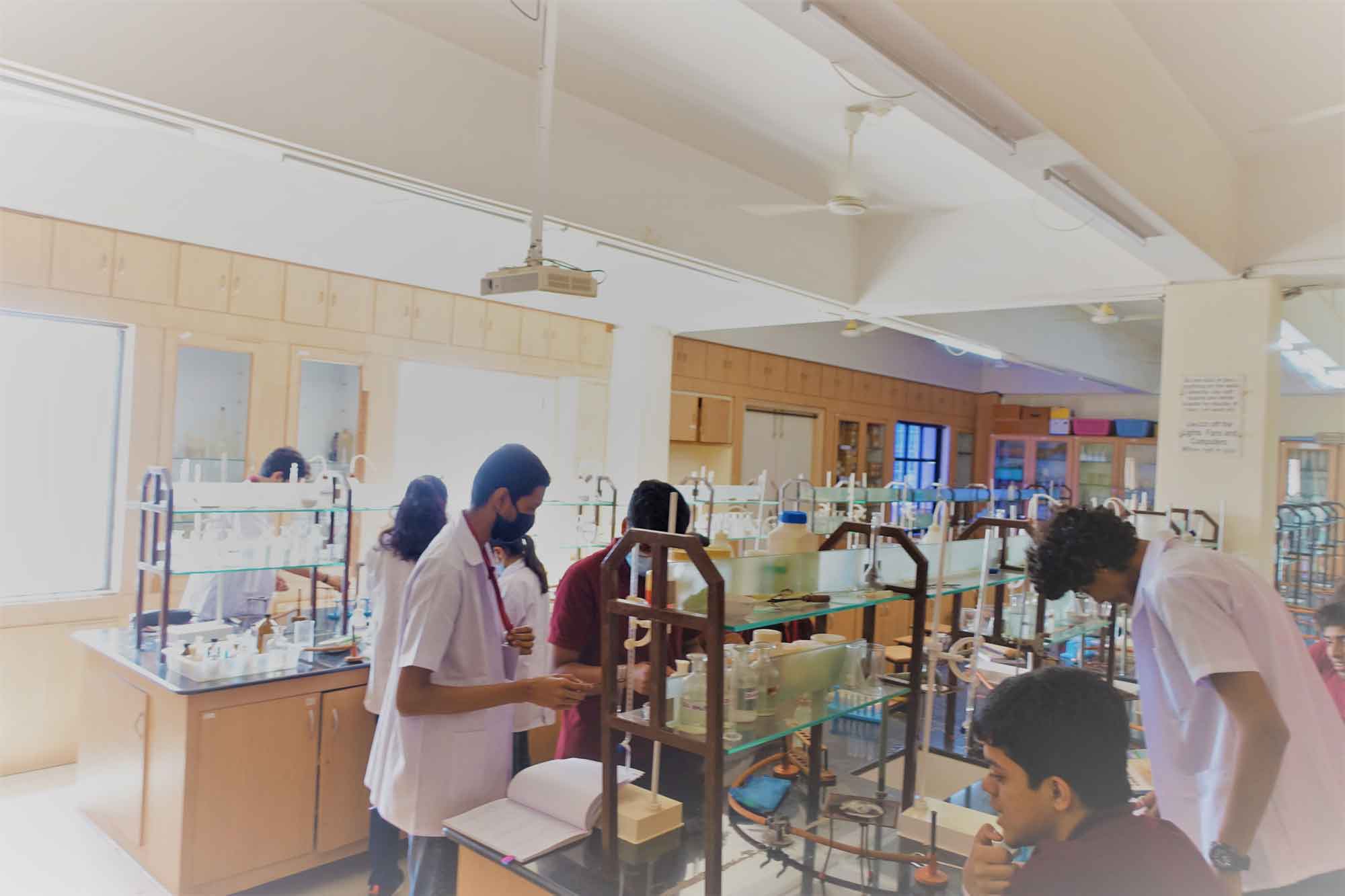
Facilities : Art-centre (performing and visual art centre)
There are 2 dedicated Art rooms for art activities by children class wise.
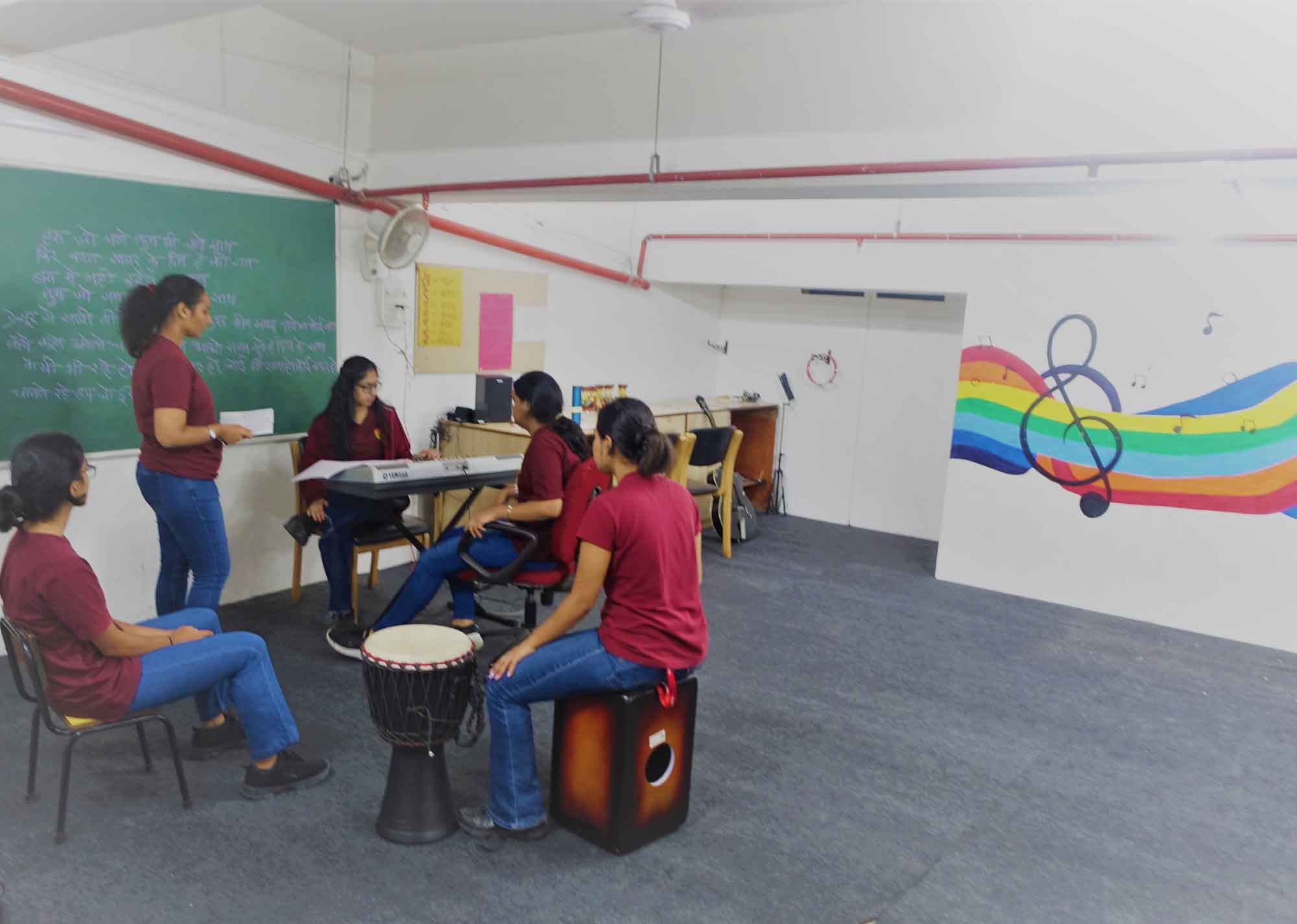
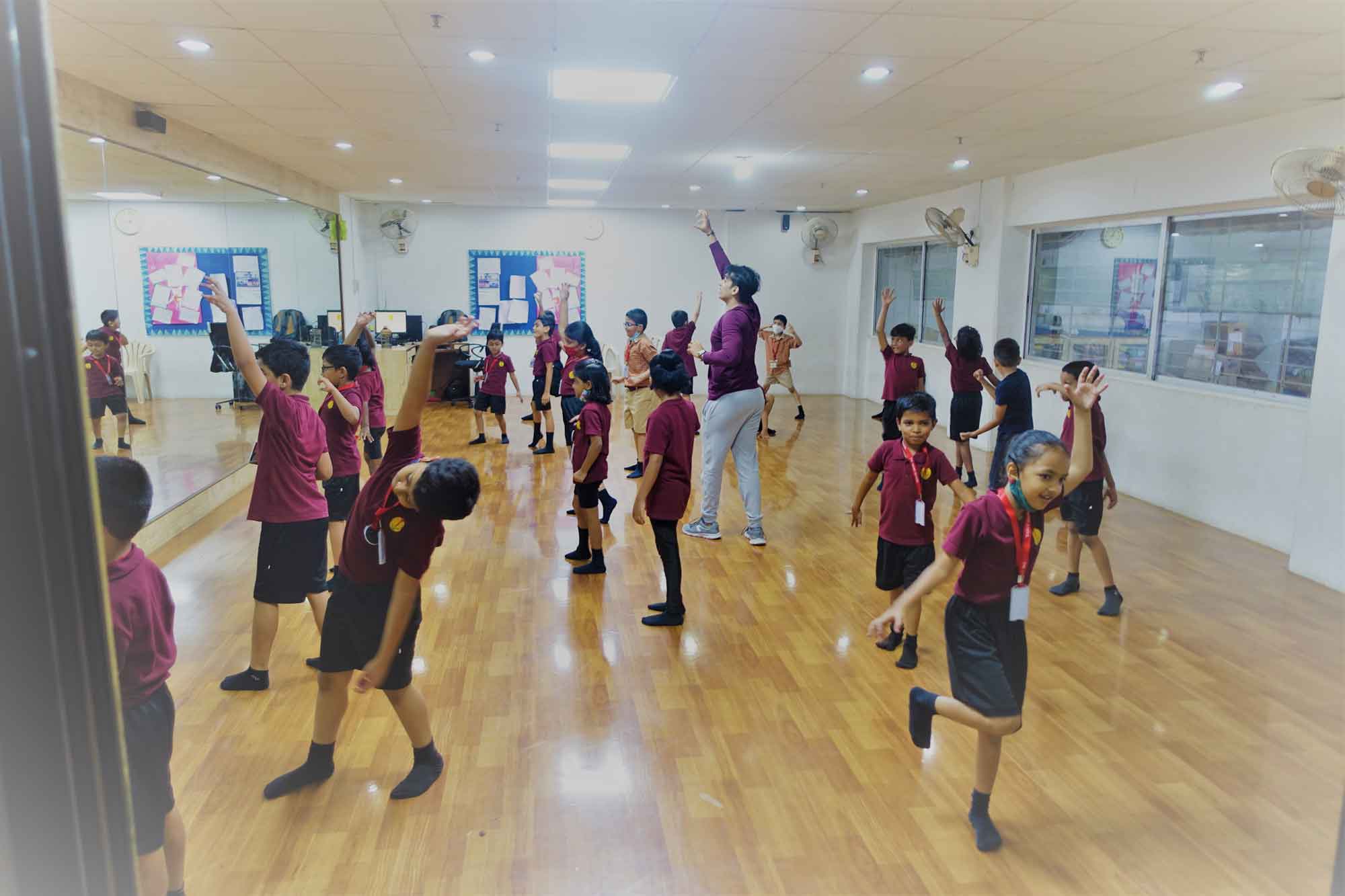
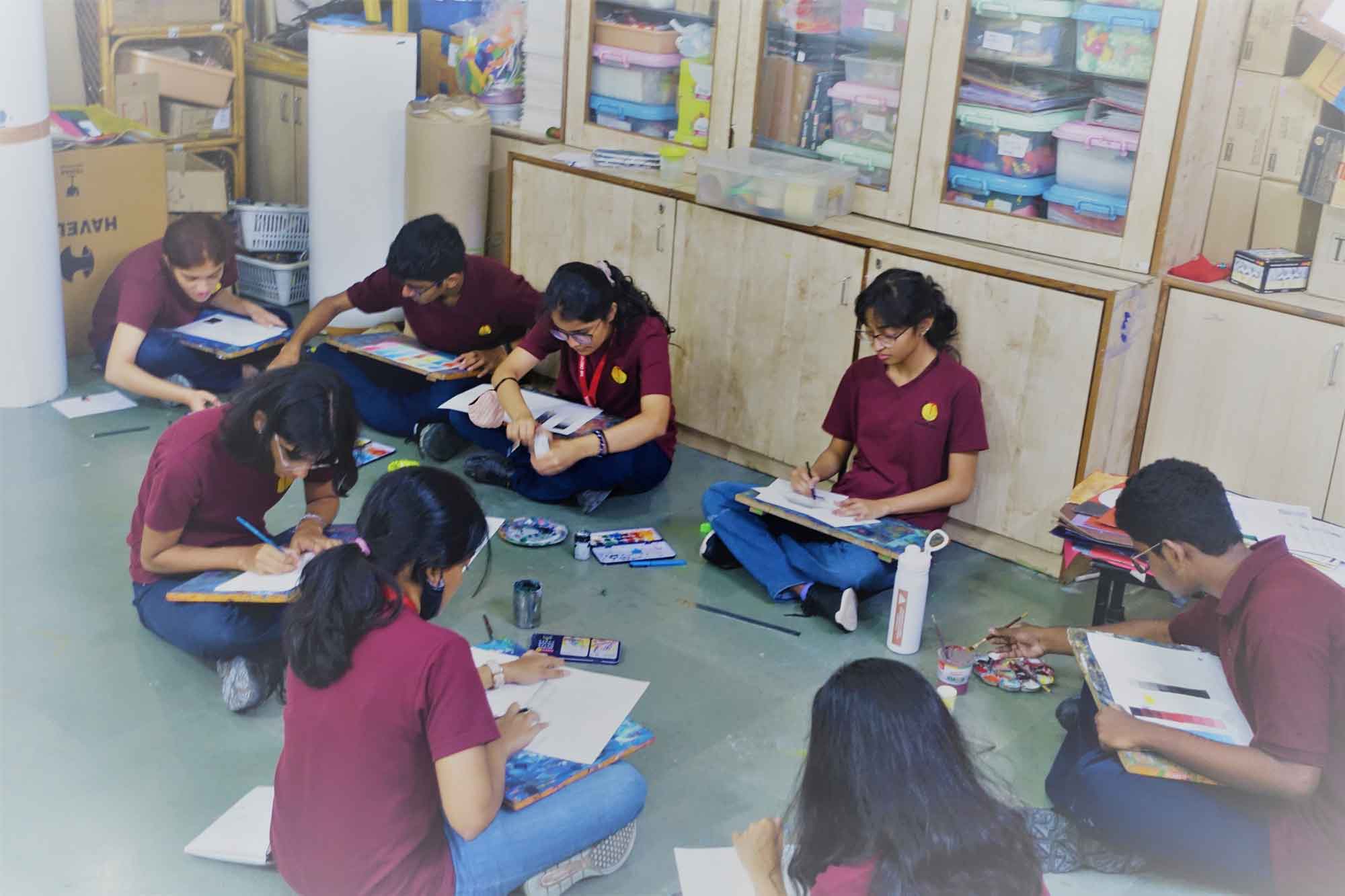
Music and dance rooms – located in the basement. There are separate rooms for percussion – the table room and the drums room, dance, music – western, classical. Children go to these rooms as per their time-table.
Facilities : Class / Central library
Library – on the third floor is used for browsing through books, reference work for students, teachers and parents if they wish to. Library skills classes are held class-wise in this space. It is used for training and workshops usually on Saturdays and holidays so that children are not disturbed.
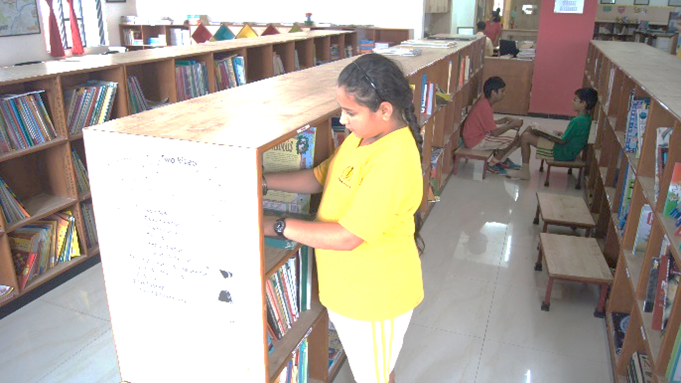
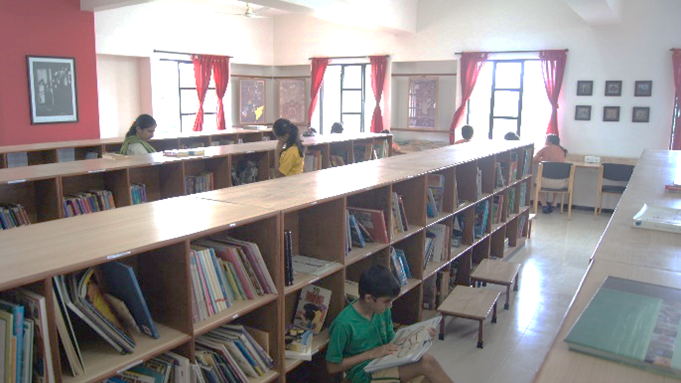
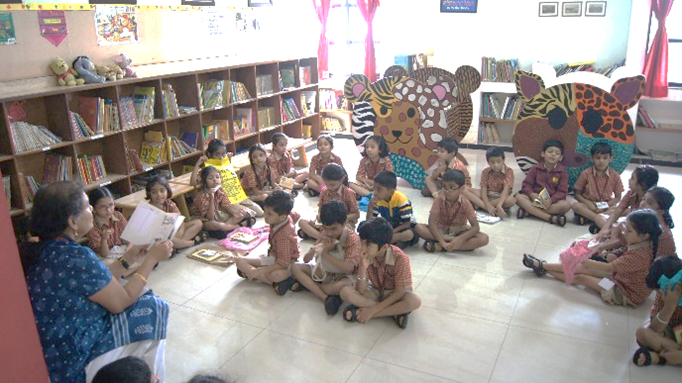
Facilities : Play Ground For Outdoor Sports
Facilities: Play Ground For Outdoor Sports (Basketball court, Volleyball court, Children's Play area ,Physical training ,Football ,etc)
Facilities : Child-care Support For Staff childrens
The Orchid School provides child-care support for staff children. After School Hours the children are well looked after by trained and efficient staff. Our Teachers work peacefully as they know that their children are in safe hands. The children freshen up, do some activity, have a snack and a nap and are relaxed.
Facilities : Transport
Transport
The school has outsourced its transport facilities to Sharvari School Bus Service. They have various routes on which they operate and ferry children and teachers to school. Each bus has a Maushi to attend to the children during the journey. The drivers and maushis have been sensitized to the school's philosophy.
Children board and get off within the school premises. The buses are parked inside the school during the day.
A Transport Committee consisting of members from the schools management, parent representatives and the transport contractors meet every few months to ensure that safety guidelines and discipline measures for students and drivers are diligently followed.
There is a travel desk for parents set up at the beginning of the academic year where parents can enquire routes, charges, collect the payment challans etc.
Transport Committee 2022 - 23 - To be announed soon
For Enquiries Contact:
- Mr. Suryakant Magar - 77760 61131 / 77670 15822
Facilies : Security
The school has various steps and measures in place to ensure every child and adult’s safety while on the school’s premises.
- The school has security personnel, stationed at the School Gates and at the Basement entrance round the clock.
- There are web-cameras installed at the gate, ground and basement.
- The security guards verify that the individual collecting the child is authorized to do so by providing an identity card.
- Private bus drivers have to collect the children from the School premises after showing the identity cards of the children.
- All the visitors entering school need to fill up a “Visitors slip” that gets counter signed after meeting the concerned staff member, then has to be deposited at the gate during exit.
- The entire staff of TOS underwent a theoretical and practical training on Disaster Management. This was done so as to prepare them in the case of any untoward incident.
- An internal disaster management team has been created and a safety evacuation plan was developed.
- This ‘surprise’ evacuation is implemented each month for the whole school. The timing is recorded and the team meets post the drill to discuss, review and revise the plan.
- There are fire extinguishers installed at appropriate places in the School.
- The students follow a disbursal plan at the end of each day so as to ensure safety on the stair cases as well.
Facilies : Housekeeping
Bharat Vikas Group, India Ltd (BVG) provides housekeeping service to TOS.
Hygiene and cleanliness is not compromised at TOS.
BVG provides housekeeping services and cleans the entire school premises and washrooms in a highly professional manner in order to maintain high level of health and safety standards during the operation time of the school.
On every weekend they spruce up the entire area and during holidays they do a special cleaning.